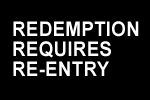|
He's beginning to believe.
Allegorically speaking, if the central question of humanity's destiny
was merely the importance of being raptured out of the big, bad world,
I suppose this would be the end of the film. Morpheus and his crew, including
the newly saved Neo, would fly away to some distant, planetary shore,
possibly shed their bodies, and know all the while that the world they'd
left behind awaits its assured destruction in a big fiery ball.
I'm grateful to note, however, that The Matrix is more dependent
upon and faithful to a specifically incarnational understanding of these
matters. From the very first moment of his removal, Neo is being prepared
for re-entry. The world has been subjected to futility. It is under siege,
which is to say that the Matrix has it under a totalitarian control. But
there is a resistance movement, a civilization in fact, that exists outside
of the control and total observation of the Matrix. This ever-mobile,
ever-beleaguered city functions in the world, seeking to free creation
from its momentary bondage to decay. By now, it should come as no surprise
to discover that this community calls itself Zion.
Neo never lays eyes on the home-base, the actual city itself, of Zion
(This is a trilogy, after all), but he does come to know what it will
mean to live a life of representation on behalf of its ways. In fact,
the red pill was his inauguration and baptism into this new, devastatingly
costly but nevertheless living way. In stark  contrast
to their visually stunning, brightly colored manifestations within the
Matrix, the crew of the Nebuchadnezzar are clothed in drab, monastic-style
fabrics and forced out of necessity to subsist on gruel. The authenticity
of Zion-style living and it's quality of being, at the very least, unplugged
are all that it has to commend itself over the sensory feast of the Matrix.
Zion is, at best, the first fruits or the testimonial deposit which exists
solely to embody the new day of authenticity which will overcome the present
darkness of the Matrix. contrast
to their visually stunning, brightly colored manifestations within the
Matrix, the crew of the Nebuchadnezzar are clothed in drab, monastic-style
fabrics and forced out of necessity to subsist on gruel. The authenticity
of Zion-style living and it's quality of being, at the very least, unplugged
are all that it has to commend itself over the sensory feast of the Matrix.
Zion is, at best, the first fruits or the testimonial deposit which exists
solely to embody the new day of authenticity which will overcome the present
darkness of the Matrix.
Redemption requires re-entry. It will not do, for instance, to simply
destroy the Matrix in one shot, because, even if this were possible, the
mass of humanity remains unconverted and would very likely die with it.
As Morpheus explains, "You have to understand that most of these
people are not ready to be unplugged and many of them are so inured, so
hopelessly dependent on the system that they will fight to protect it."
The paralyzed comprehensibilities of their captive minds require a more
subversively wrought conversion (as we've seen in the case of Neo), and
even afterwards, the blue pill of escape and blissful delusion remains
an ongoing temptation. Aboard the Nebuchadnezzar, we have one crew-member,
Cypher (whom the agents of the Matrix call "Mr. Reagan") who
wants to be plugged in again. In exchange for handing over Morpheus, he
insists that his memory of life outside the Matrix be erased and his mind
be immediately reincorporated in the life of a celebrity actor. The process
of dissimulation (against that of redemption) is something we will happily
have done to ourselves. We will, as it turns out, pay for the privilege.
Cypher wants, among other things, the taste of steak and understands that
regaining the world of illusory sensations will require the forfeiture
of his soul. He knows that such a final re-entry will mean surrendering
his mind to the system. The redemptive re-entry of Neo, and any other
Zion citizen, will require a different mental exercise. The action of
bearing witness against the mind-altering powers of the Matrix and for
the not-yet-awakened living will be a practice of belief, a mindfulness
that asserts what it knows against the all-pervasive force of appearances.
Holding on to reality, bringing it in as it were, will be an all-consuming
occupation.
5
<Prev
| Next>
Copyright
©2003 by David Dark.
Adapted from Everyday Apocalypse, published by Brazos
Press; used with permission.
|

